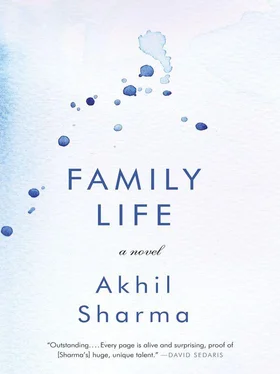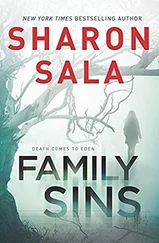Around eight my uncle arrived in his dark pants and short-sleeve shirt, with his triangle of wispy white hair. He stood by the sink drinking a glass of water. He still had his shoes on. For him to be wearing shoes in the kitchen was so strange that it made the kitchen feel like it wasn’t a real kitchen but a display in a furniture store.
“What’s happened?” I asked.
He patted my head. “We don’t know.”
About ten thirty, my uncle drove us to the bus station. We were going to pick up my mother. The fact that my mother was coming made what had occurred seem very serious. When I breathed, I could feel my chest.
The bus station was a large, high chamber, with ceiling fans spinning far overhead. The air was heavy and warm and smelled of gasoline and salty french fries. Periodically there were loud announcements in which a man told us what bus had arrived or was about to leave. I sat on a wooden bench partitioned by wooden arms. A series of automatic doors kept flapping back and forth like the paddles of a pinball machine.
Finally, my mother walked through one of them. Her hair was loose, her face flattened with fear. She was wearing a yellow sari and carrying a black duffel bag.
Seeing my mother, I worried that she might think I was bad for not crying. I walked up to her. She looked down. It was as if she didn’t recognize me. “Don’t worry,” I said. “I’ve cried already.”
The hospital room was bright and white and noisy. There was the whir of machines and something beeping. There was a loud motorized rumble, almost like that of a generator.
Birju was lying on a bed with railings. The railings reminded me of a crib. There were poles on wheels all around the bed. The poles had bags hanging from them and also machines that were attached with clamps. Wires and tubes came from these and touched Birju. It was like he was in the middle of many clotheslines.
My mother stopped in the doorway. She started to cry. I stood beside her, holding the duffel bag before me. I became angry with Birju for having created this problem.
Birju had a plastic mask over his mouth and nose, making him look like a fighter pilot. His eyes were wide open, as if in panic. He appeared to be staring up at some invisible thing and that thing was pressing down on his chest.
Was the mask pumping a gas which was keeping him still? I imagined removing the mask, and Birju coughing and starting to speak. He would complain that people had not removed the mask earlier, that even I had known what to do.
BIRJU HAD DIVED into the swimming pool. He had struck his head on the pool’s cement bottom and lain there stunned for three minutes. Water had surged down his throat, been dragged into his lungs as he tried to breathe. His lungs had peeled away from the insides of his chest.
Back at the house, my uncle carried a large cardboard box into the room that Birju and I had shared, and he placed it against a wall. My aunt and mother draped a white sheet over the box. They taped postcards of various gods on the wall so that these appeared to be gazing at the altar. On the altar itself, they placed a spoon and in the spoon, a wick soaked in clarified butter. They put a wad of dough on the altar and stuck incense sticks into the dough. They did all this quickly and quietly. When they spoke, it was in a whisper.
The ceiling lights were turned off. The flame in the spoon and the smoke rising from it sent shadows shaking over the walls. I lay down on a strip of foam beneath one of the windows. My aunt and mother stretched themselves face down before the altar. They sang prayers. “You can make a mute sing. You can make a cripple leap over a mountain.” Their singing kept waking me. I understood that it was proper to pray in moments like these, but still, I knew that Birju was going to be all right — wouldn’t it be better for everyone to get some sleep?
Around four in the morning, the ceiling lights were turned on. My first thought was that I had imagined everything.
But my mother was standing before the altar and the air was thick with incense. She had her hands pressed together and was wearing a blue silk sari and a gold necklace — she looked like she was going to a wedding. My aunt came into the room. She, too, was dressed as if for something special. She joined my mother in saluting the altar.
A little later, about to leave for the hospital, we stood in the driveway. It was still night. I looked up at the stars. There were thousands of them, some of them bright, some of them dim. I suddenly had the sense that what was happening was a mistake, that we had been given somebody else’s life.
At the hospital, Birju’s bed was empty. He had been taken for an operation. The four of us sat by the bed and sang prayers.
IN THE DAYS and weeks that followed, I spent most of each day sitting by Birju’s bed chanting to him from the Ramayana . The book was a large hardcover wrapped in saffron cloth. Some of the pages had grease stains from the butter used in prayers, and one could look through the stains and see the letters on the next page. Every time I opened the book, there was a puff of incense smell from the book having spent so many years near altars.
I had never prayed like this before, every day, hour after hour, praying till my throat became raw and even my tongue and gums hurt. I had not believed in God till then. Now, I started to think that people wouldn’t be building temples, going on pilgrimages, if they weren’t going to get something out of it. I began to believe there had to be a God, but that he was like the president, distant, busy, not interested in small things.
Time passed. One afternoon, I watched my mother cut Birju’s fingernails. She looked scared as she did this. She had his hand forced open and was trying to keep it from clenching. “Is it all right?” she asked him. I felt like I was dreaming.
Birju had his oxygen mask removed. Many of the wheeled poles were taken away. Now with his eyes open he looked the way he always had except it was as if he was lost in thought. A doctor said Birju was blind, that oxygen deprivation had destroyed his corneas. It seemed disloyal to believe this; it seemed that the loyal thing was to believe that nothing much was wrong with him and that he would be better any day now. Hearing the doctor, I felt that I should be angry at him, that I should say God could do anything. I didn’t feel anger, though. What I felt was pity for poor Birju. I wanted to kiss his cheeks. I wanted to tell him he was beautiful and that we would take care of him always.
Birju moaned, he yawned, he coughed, but even with his eyes open he appeared to be dreaming. Birju responded to things. If there was a loud noise, he turned his head in the direction of the sound. Then he rolled his head back and just lay there. Often he smacked his lips and puffed spit. Occasionally he had a seizure. His teeth would clamp shut and squeak against each other. His body would stiffen, his waist rise off the bed, and the bed would begin to rattle. Seeing this frightened me. I would stand by the bed and look at him through the railings and wonder what to do.
The accident had occurred in early August. September came and school began. I started attending school in Arlington. The school was three-quarters of a mile from my aunt and uncle’s house.
I didn’t cry at home or at the hospital because I didn’t want to add to my parents’ problems. On the way to school, though, I would. Strange things made me cry. The weight of my book bag, how it pushed me down would set me crying. Sometimes some thought of Birju would brush against me. My mother had written to the Bronx High School of Science and obtained a year’s deferment. As I sobbed, I would be amazed at how much I loved my brother. I had not known he mattered so much to me.
Читать дальше












